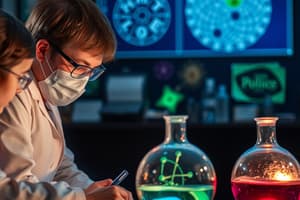Podcast
Questions and Answers
What is the primary focus of good education in Science according to the National Curriculum Framework?
What is the primary focus of good education in Science according to the National Curriculum Framework?
- Memorizing scientific terms and definitions
- Enhancing students' mathematical skills
- Developing a mindset of inquiry and research (correct)
- Focusing solely on laboratory experiments
Which of the following capacities does learning Science help to develop?
Which of the following capacities does learning Science help to develop?
- Political awareness
- Cultural heritage knowledge
- Physical strength
- Creative thinking (correct)
Which disciplines does Science education in schools draw from for an interdisciplinary understanding?
Which disciplines does Science education in schools draw from for an interdisciplinary understanding?
- Biology, Chemistry, Physics, and Mathematics (correct)
- Geography and Literature
- Only Biology and Chemistry
- Art and History
What is one of the key reasons for ensuring high-quality education in Science?
What is one of the key reasons for ensuring high-quality education in Science?
When should children start learning the process of science according to the framework?
When should children start learning the process of science according to the framework?
What essential skills does science education aim to equip students with?
What essential skills does science education aim to equip students with?
How does Science education relate to other subjects?
How does Science education relate to other subjects?
What does the process of Science involve?
What does the process of Science involve?
What pedagogic methods allow students to examine concepts from multiple lenses?
What pedagogic methods allow students to examine concepts from multiple lenses?
What is one requirement for materials used in Science Education at the Middle Stage?
What is one requirement for materials used in Science Education at the Middle Stage?
How can teachers extend the use of materials beyond science kits?
How can teachers extend the use of materials beyond science kits?
Why are science laboratories important in science education?
Why are science laboratories important in science education?
Which of the following is an example of a pedagogic approach that integrates various disciplines?
Which of the following is an example of a pedagogic approach that integrates various disciplines?
What is a characteristic of quality science teaching resources?
What is a characteristic of quality science teaching resources?
Which approach is NOT effective for engaging students in scientific inquiry?
Which approach is NOT effective for engaging students in scientific inquiry?
What can be derived from understanding the qualities and properties of sound?
What can be derived from understanding the qualities and properties of sound?
What is essential for students to develop in relation to Science in education?
What is essential for students to develop in relation to Science in education?
How should concepts like rectilinear propagation of light be taught to students?
How should concepts like rectilinear propagation of light be taught to students?
Why is student observation important in the context of learning Science?
Why is student observation important in the context of learning Science?
Which of the following is emphasized in the relationship between Science, Technology, and Society?
Which of the following is emphasized in the relationship between Science, Technology, and Society?
What role do indigenous practices play in the understanding of Science according to the curriculum?
What role do indigenous practices play in the understanding of Science according to the curriculum?
What is indicated as a key method for selecting content in Science education?
What is indicated as a key method for selecting content in Science education?
What must students do when conducting scientific inquiries?
What must students do when conducting scientific inquiries?
What happens if suitable content is not provided in Science education?
What happens if suitable content is not provided in Science education?
Which arrangement of bulbs reflects their brightness in a circuit?
Which arrangement of bulbs reflects their brightness in a circuit?
What is the primary aim of the hot container experiment?
What is the primary aim of the hot container experiment?
What skills are assessed through the hot container experiment?
What skills are assessed through the hot container experiment?
How long will the hot container experiment last?
How long will the hot container experiment last?
Which item is NOT mentioned as part of the materials for the hot container experiment?
Which item is NOT mentioned as part of the materials for the hot container experiment?
What is one of the assessments involved in the hot container activity?
What is one of the assessments involved in the hot container activity?
What must students record during the hot container experiment?
What must students record during the hot container experiment?
Which thermometers are used in the hot container experiment?
Which thermometers are used in the hot container experiment?
Which characteristic is NOT used to classify matter?
Which characteristic is NOT used to classify matter?
What is a key observation when explaining the phenomena caused by changes in temperature?
What is a key observation when explaining the phenomena caused by changes in temperature?
What type of motion is characterized by constant speed and direction?
What type of motion is characterized by constant speed and direction?
Which statement best describes how electricity works in simple circuits?
Which statement best describes how electricity works in simple circuits?
Which of the following properties best characterizes a magnet?
Which of the following properties best characterizes a magnet?
What is the primary role of a cell membrane?
What is the primary role of a cell membrane?
Which term is used to describe the physical change of matter from liquid to gas?
Which term is used to describe the physical change of matter from liquid to gas?
What concept explains the relationship between mass and weight?
What concept explains the relationship between mass and weight?
Which process is described as the change of state from solid directly to gas?
Which process is described as the change of state from solid directly to gas?
Which scientific tool is typically used to observe celestial objects?
Which scientific tool is typically used to observe celestial objects?
What is the primary focus of understanding the components of health and hygiene?
What is the primary focus of understanding the components of health and hygiene?
How do scientists communicate their findings effectively?
How do scientists communicate their findings effectively?
Which process represents a biological change occurring during adolescence?
Which process represents a biological change occurring during adolescence?
What are simple machines primarily used for?
What are simple machines primarily used for?
Flashcards are hidden until you start studying
Study Notes
Science Education
- Science is the study of the natural and physical world through observation, questioning, hypothesis formation, experimentation, analysis, and continuous knowledge revision.
- The scientific process is not exclusive to scientists in labs, but fosters essential capacities for rational living and decision-making.
- Science education equips students with valid knowledge and scientific values such as curiosity, creativity, evidence-based thinking, and sound decision-making.
- School science draws on disciplines like Biology, Chemistry, Physics, Earth Sciences, Mathematics, Computational Sciences, and relevant Social Science and Vocational Education to provide an interdisciplinary understanding of science in everyday life.
- High-quality science education, along with a mindset of inquiry and research, is crucial for tackling global challenges like climate change, healthcare improvement, technological advancement, sustainable development, equitable livelihoods, and harmonious living with nature.
- The NCF emphasizes the importance of science education and its relationship with other subjects like Social Science and Vocational Education to address societal challenges.
- Learning the basics of the scientific method should be introduced in the Foundational Stage itself.
Interdisciplinary Science Education
- Students should understand connections between science and other school subjects, such as literature, art, and history.
- Students should be able to connect science to real-world issues, like technology, society, and environmental problems.
- Science education must also include India's contributions to scientific knowledge, including traditional practices in health and medicine.
Scientific Inquiry and Communication
- Students should be able to conduct scientific inquiry independently, designing and carrying out experiments.
- Students need to connect their experimental findings to scientific concepts, laws, and principles.
- They should be able to communicate their findings clearly and creatively using various methods.
Selecting Relevant Science Content
- Science content must be connected to students’ lives and surroundings.
- Pedagogical approaches like inquiry-based learning and projects provide opportunities to apply scientific concepts across disciplines.
- Science education should integrate different perspectives, including socio-cultural, economic, and emotional aspects.
Importance of Resources in Science Teaching
- Science laboratories are crucial for effective science education.
- Teachers should use simple, user-friendly materials and equipment, even in schools without dedicated labs.
- Science kits are a good starting point, but teachers should encourage the use of improvised materials for experiments.
- Using readily available materials allows for wider exploration of scientific concepts and increases student engagement.
Assessment in Science Teaching
- Experiments play a key role in assessing students' understanding of scientific concepts, their application, and their ability to use the scientific method.
- Experiments should encourage students to collect and interpret data, verify scientific ideas, and communicate their observations and conclusions clearly.
- Science assessments should also focus on students' ability to use appropriate scientific vocabulary and tools.
Studying That Suits You
Use AI to generate personalized quizzes and flashcards to suit your learning preferences.




